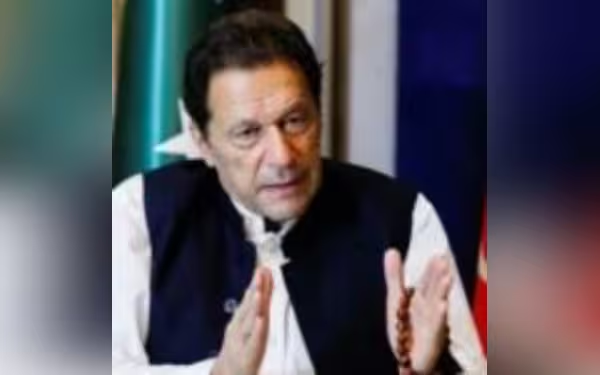Saturday, November 16, 2024 07:39 PM
Imran Khan Appeals to UN Over Constitutional Amendments Threatening Judiciary
- Imran Khan warns UN about judicial independence threats.
- Proposed amendments could undermine rule of law in Pakistan.
- Khan's letter highlights political turmoil and human rights concerns.
 Image Credits: pakistantoday
Image Credits: pakistantodayImran Khan addresses the UN, raising concerns over constitutional amendments threatening judiciary independence and human rights in Pakistan.
In a significant development, Imran Khan, the founder of the Pakistan Tehreek-e-Insaf (PTI) party and former Prime Minister of Pakistan, has reached out to the United Nations with urgent concerns regarding proposed amendments to the Constitution. These amendments, if enacted, are believed to threaten the independence of the judiciary and the fragile state of human rights in Pakistan. Khan's appeal highlights the ongoing political turmoil in the country and raises alarms about the potential implications for the rule of law.
According to reports, Khan's letter was directed to Margaret Satterthwaite, the UN Special Rapporteur on the Independence of Judges and Lawyers. He expressed his worries about the government's attempts to pass these amendments, which could significantly alter the judicial landscape in Pakistan. The amendments under discussion include extending the retirement age for judges and establishing a new Federal Constitutional Court, which has sparked fierce opposition from Khan and his supporters.
This is not the first time Khan has sought international intervention in domestic matters. Previously, he appealed to the International Monetary Fund (IMF) to conduct an audit of the February 8 elections, which were marred by allegations of rigging. His actions have drawn criticism from the current government, which accuses him of jeopardizing the country's economic stability for his political gain.
In his recent appeal, Khan specifically pointed to the proposed 26th constitutional amendment, arguing that it poses a serious threat to the rule of law and the protection of fundamental rights for all citizens, including himself and his supporters. He urged the UN to issue an urgent communication to the Pakistani government regarding these amendments.
The proposed changes include removing jurisdiction from the Supreme Court and transferring it to the new Federal Constitutional Court. This shift raises serious concerns about political interference in judicial appointments, as the selection of the chief justice would be determined by a National Assembly committee that meets in private. Such a move could undermine public scrutiny and judicial independence.
Furthermore, if these amendments are passed, they could severely limit Khan's ability to contest legal cases against him, including potential trials in military courts. This situation could further erode the independence of the judiciary and the separation of powers, which are essential for a functioning democracy.
Khan's legal team has voiced strong objections to these proposed changes, asserting that they are designed to diminish the Supreme Court's authority and perpetuate impunity for human rights violations in Pakistan. They have highlighted the alarming trend of judges being coerced into delivering specific verdicts in politically sensitive cases, which they believe signals a rapid decline in the rule of law.
As the political landscape in Pakistan continues to evolve, the implications of these constitutional amendments could have far-reaching effects on the country's governance and the protection of civil liberties. The international community, particularly the United Nations, will be closely monitoring the situation as it unfolds. The outcome of this appeal may not only impact Khan and his party but could also set a precedent for the future of judicial independence and human rights in Pakistan.













